(3000 people let in since September 2010)

(Global News dropped a bombshell about secret permits given to otherwise inadmissible people to Canada. This understandably shocked people.)

1. Media Bias, Lies, Omissions And Corruption
(a) https://canucklaw.ca/unifor-denies-crawling-into-bed-with-government
2. Important Links
(1) https://canucklaw.ca/facts-figures-the-ugly-truth-about-replacement-migration-in-canada/
(2) https://globalnews.ca/news/6289240/canada-secret-program-grants-visas-to-war-criminals-terrorists-security-threats/
(3) http://archive.is/SAVc7
(4) https://laws-lois.justice.gc.ca/eng/acts/I-2.5/
(5) http://archive.is/wip/G9Lui
Annual Immigration Reports To Parliament
(a) 2004 Annual Report to Parliament
(b) 2005 Annual Report to Parliament
(c) 2006 Annual Report to Parliament
(d) 2007 Annual Report to Parliament
(e) 2008 Annual Report to Parliament
(f) 2009 Annual Report to Parliament
(g) 2010 Annual Report to Parliament
(h) 2011 Annual Report to Parliament
(i) 2012 Annual Report to Parliament
(j) 2013 Annual Report to Parliament
(k) 2014 Annual Report to Parliament
(l) 2015 Annual Report to Parliament
(m) 2016 Annual Report to Parliament
(n) 2017 Annual Report to Parliament
(o) 2018 Annual Report to Parliament
(p) Archived listings of Reports
3. Context For This Article
It is appreciated that Global News has reported on the numbers of foreigners who would otherwise be inadmissible to Canada under a September 2010 change in visa policies. They go on to list the approximately 3,000 people who have been granted Temporary Residence Permits since then. They use the Annual Immigration Reports to Parliament as references, and give a link to the 2004 to 2018 reports.
For reference, those reports are often cited on this website, and can be found in the above section.
However, it seemed Global News (either accidently or intentionally) omitted a much, MUCH bigger problem. Between 2002 and 2017, there have been over 186,000 people let into Canada who were otherwise inadmissible under the Immigration and Refugee Protection Act.
4. What Global News Tells You
(Page 21 of 2011 Annual Immigration Report to Parliament)
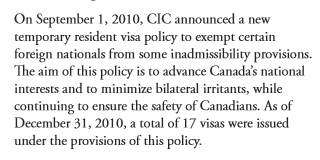
| YEAR | TRP Issued |
|---|---|
| 2010 | 17 |
| 2011 | 53 |
| 2012 | 53 |
| 2013 | 280 |
| 2014 | 385 |
| 2015 | 1,063 |
| 2016 | 596 |
| 2017 | 555 |
This article reports on a new directive to allow previously inadmissible people into Canada if it is deemed to be in the national interest. Not only is this troubling, but the secrecy behind it is alarming as well. Digging into it and publishing the information is a very important thing for the Canadian public.
It’s also pleasing to see that this news outlet took the time to dive into the Annual Immigration Reports to Parliament to get numbers for how many people this was happening to. A great bit of investigative journalism.
Presumably this is what Global News refers to, and yes, it does grant the Immigration Minister discretion to hand out permanent residence. Now, in fairness, there is a difference between this provision which allows for PR status, and coming to Canada temporarily under Rule 24(1). Still, if a person is a serious threat, they should not be allowed into Canada, temporarily or permanently.
Humanitarian and compassionate considerations — Minister’s own initiative
25.1 (1) The Minister may, on the Minister’s own initiative, examine the circumstances concerning a foreign national who is inadmissible — other than under section 34, 35 or 37 — or who does not meet the requirements of this Act and may grant the foreign national permanent resident status or an exemption from any applicable criteria or obligations of this Act if the Minister is of the opinion that it is justified by humanitarian and compassionate considerations relating to the foreign national, taking into account the best interests of a child directly affected.
Marginal note:
Exemption
(2) The Minister may exempt the foreign national from the payment of any applicable fees in respect of the examination of their circumstances under subsection (1).
Now, what’s the problem with the original article? Despite going through these reports, they chose not to get into how many foreigners were allowed to live temporarily in Canada, despite being previously barred. This included various criminal and security inadmissibility grounds. It seems bizarre to ignore the scope of the problem while focusing on a small piece of it.
5. What Global News Leaves Out
While this important information to know, there is a much larger picture to consider. Let’s start with the over 186,000 people given Temporary Resident Permits from 2002 to 2017. The overwhelming majority of those are either for criminal inadmissibility, serious criminal behaviour, or failing to comply with regulations.
Specifically, look at Section 24(1) of the Immigration and Refugee Protection Act. Again, this refers to “temporary” residents, while Rule 25.1 applies to potential “permanent” residents. Still, it is a very important omission to make.
Temporary resident permit
24 (1) A foreign national who, in the opinion of an officer, is inadmissible or does not meet the requirements of this Act becomes a temporary resident if an officer is of the opinion that it is justified in the circumstances and issues a temporary resident permit, which may be cancelled at any time.
(Page 29 of 2004 Annual Immigration Report to Parliament)
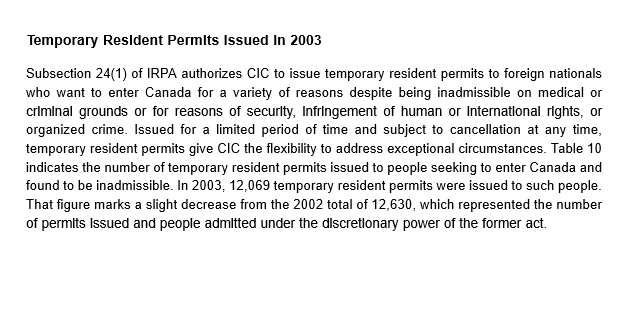
(Page 33 of 2005 Annual Immigration Report to Parliament)
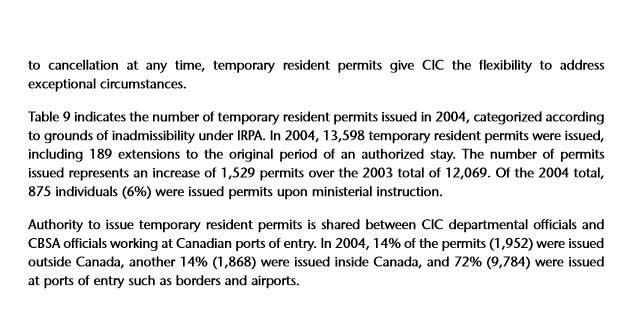
(Page 25 of 2006 Annual Immigration Report to Parliament)
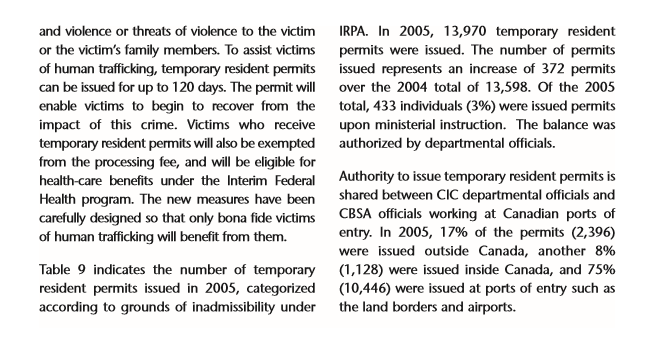
(Page 26 of 2007 Annual Immigration Report to Parliament)

(Page 29 of 2008 Annual Immigration Report to Parliament)
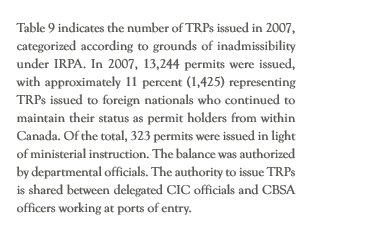
(Page 19 of 2009 Annual Immigration Report to Parliament)
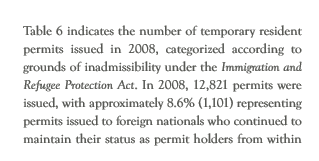
(Page 16 of 2010 Annual Immigration Report to Parliament)
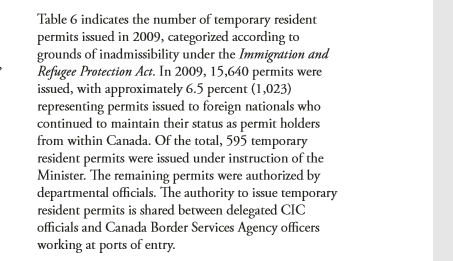
(Page 21 of 2011 Annual Immigration Report to Parliament)

A very interesting situation. Global News (accurately reports on 17 TRPs granted under this new secretive order, with no information available. However, they choose to omit the 12,452 TRP that “were” granted to inadmissible people, the majority being criminal or serious criminal. They also leave out 86 security ineligibilities, and 24 human rights ineligibilities.
And no, this is not a cut and paste job. They really are on adjacent paragraphs.
(Page 18 of 2012 Annual Immigration Report to Parliament)
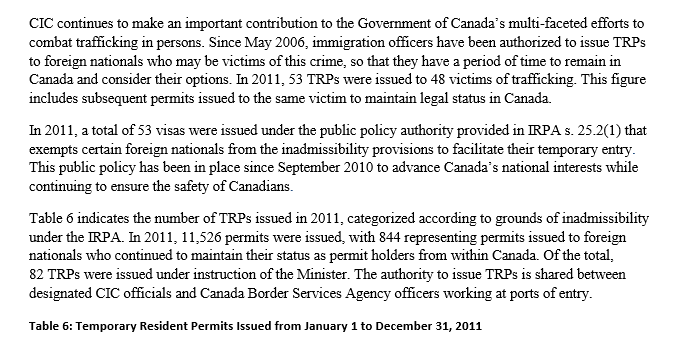
Again, this is the actual report to Parliament, and not any editing on my part. Global News (correctly) points out the 53 TRP issued under Rule 25.2(1), but then ignores the 11,526 TRPs handed out to other inadmissible people. Seems to be missing the obvious here.
(Page 22 of 2013 Annual Immigration Report to Parliament)
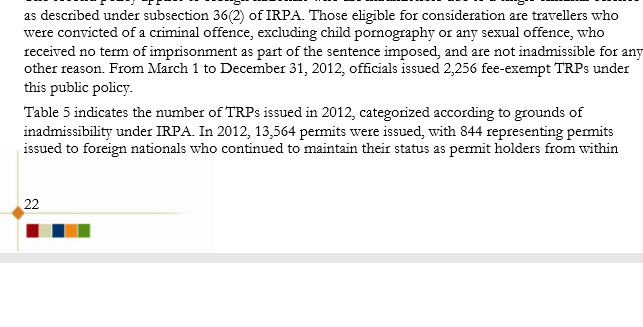
(Page 18 of 2014 Annual Immigration Report to Parliament)
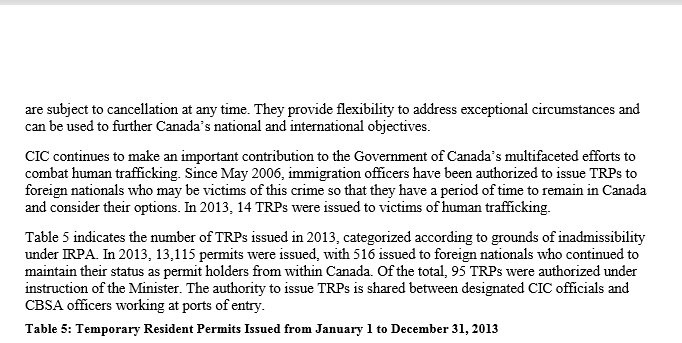
(Page 18 of 2015 Annual Immigration Report to Parliament)
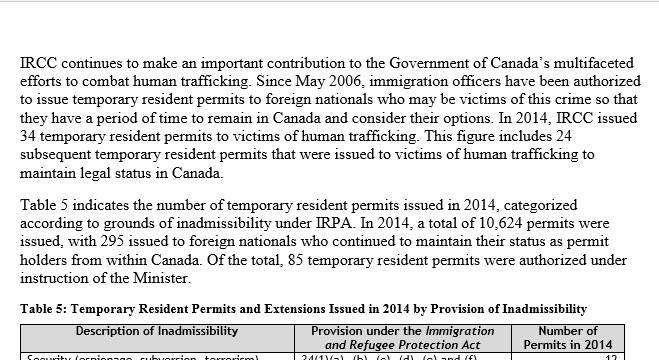
(Page 15 of 2016 Annual Immigration Report to Parliament)
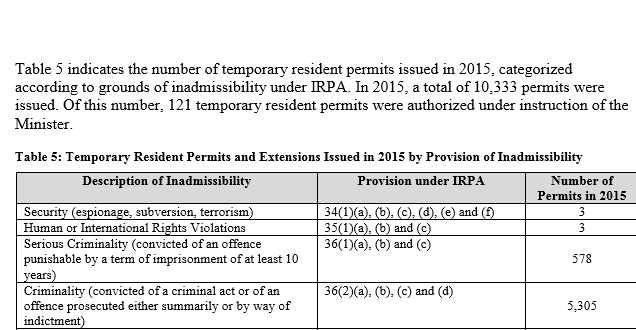
(Page 19 of 2017 Annual Immigration Report to Parliament)
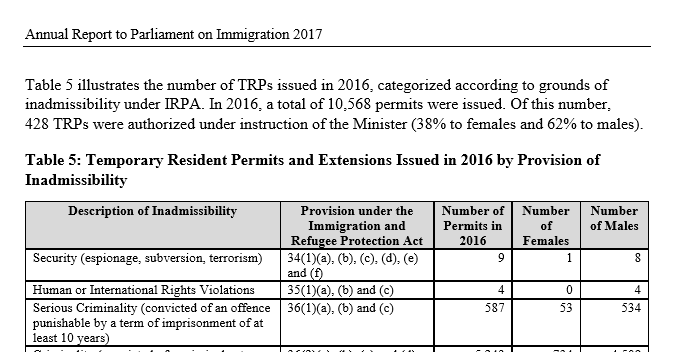
(Page 38 of 2018 Annual Immigration Report to Parliament)

| Year | Permits | Cumulative |
|---|---|---|
| 2002 | 12,630 | 12,630 |
| 2003 | 12,069 | 24,699 |
| 2004 | 13,598 | 38,297 |
| 2005 | 13,970 | 52,267 |
| 2006 | 13,412 | 65,679 |
| 2007 | 13,244 | 78,923 |
| 2008 | 12,821 | 91,744 |
| 2009 | 15,640 | 107,384 |
| 2010 | 12,452 | 119,836 |
| 2011 | 11,526 | 131,362 |
| 2012 | 13,564 | 144,926 |
| 2013 | 13,115 | 158,041 |
| 2014 | 10,624 | 168,665 |
| 2015 | 10,333 | 178,998 |
| 2016 | 10,568 | 189,566 |
| 2017 | 9,221 | 198,787 |
How does a serious news outlet go through the same Annual Reports to Parliament on Immigration (as done here), and grab the data on 3,000 people let in, but then leave out the 199,000 others who should not have entered?
Seriously, was this done intentionally?
6. Grounds For Inadmissibility
Security
34 (1) A permanent resident or a foreign national is inadmissible on security grounds for
(a) engaging in an act of espionage that is against Canada or that is contrary to Canada’s interests;
(b) engaging in or instigating the subversion by force of any government;
(b.1) engaging in an act of subversion against a democratic government, institution or process as they are understood in Canada;
(c) engaging in terrorism;
(d) being a danger to the security of Canada;
(e) engaging in acts of violence that would or might endanger the lives or safety of persons in Canada; or
(f) being a member of an organization that there are reasonable grounds to believe engages, has engaged or will engage in acts referred to in paragraph (a), (b), (b.1) or (c).
(2) [Repealed, 2013, c. 16, s. 13]
Human or international rights violations
35 (1) A permanent resident or a foreign national is inadmissible on grounds of violating human or international rights for
(a) committing an act outside Canada that constitutes an offence referred to in sections 4 to 7 of the Crimes Against Humanity and War Crimes Act;
(b) being a prescribed senior official in the service of a government that, in the opinion of the Minister, engages or has engaged in terrorism, systematic or gross human rights violations, or genocide, a war crime or a crime against humanity within the meaning of subsections 6(3) to (5) of the Crimes Against Humanity and War Crimes Act;
(c) being a person, other than a permanent resident, whose entry into or stay in Canada is restricted pursuant to a decision, resolution or measure of an international organization of states or association of states, of which Canada is a member, that imposes sanctions on a country against which Canada has imposed or has agreed to impose sanctions in concert with that organization or association;
(d) being a person, other than a permanent resident, who is currently the subject of an order or regulation made under section 4 of the Special Economic Measures Act on the grounds that any of the circumstances described in paragraph 4(1.1)(c) or (d) of that Act has occurred; or
(e) being a person, other than a permanent resident, who is currently the subject of an order or regulation made under section 4 of the Justice for Victims of Corrupt Foreign Officials Act (Sergei Magnitsky Law).
Marginal note:
Clarification
(2) For greater certainty, despite section 33, a person who ceases being the subject of an order or regulation referred to in paragraph (1)(d) or (e) is no longer inadmissible under that paragraph.
Serious criminality
36 (1) A permanent resident or a foreign national is inadmissible on grounds of serious criminality for
(a) having been convicted in Canada of an offence under an Act of Parliament punishable by a maximum term of imprisonment of at least 10 years, or of an offence under an Act of Parliament for which a term of imprisonment of more than six months has been imposed;
(b) having been convicted of an offence outside Canada that, if committed in Canada, would constitute an offence under an Act of Parliament punishable by a maximum term of imprisonment of at least 10 years; or
(c) committing an act outside Canada that is an offence in the place where it was committed and that, if committed in Canada, would constitute an offence under an Act of Parliament punishable by a maximum term of imprisonment of at least 10 years.
Marginal note:
Criminality
(2) A foreign national is inadmissible on grounds of criminality for
(a) having been convicted in Canada of an offence under an Act of Parliament punishable by way of indictment, or of two offences under any Act of Parliament not arising out of a single occurrence;
(b) having been convicted outside Canada of an offence that, if committed in Canada, would constitute an indictable offence under an Act of Parliament, or of two offences not arising out of a single occurrence that, if committed in Canada, would constitute offences under an Act of Parliament;
(c) committing an act outside Canada that is an offence in the place where it was committed and that, if committed in Canada, would constitute an indictable offence under an Act of Parliament; or
(d) committing, on entering Canada, an offence under an Act of Parliament prescribed by regulations.
Marginal note:
Application
(3) The following provisions govern subsections (1) and (2):
(a) an offence that may be prosecuted either summarily or by way of indictment is deemed to be an indictable offence, even if it has been prosecuted summarily;
(b) inadmissibility under subsections (1) and (2) may not be based on a conviction in respect of which a record suspension has been ordered and has not been revoked or ceased to have effect under the Criminal Records Act, or in respect of which there has been a final determination of an acquittal;
(c) the matters referred to in paragraphs (1)(b) and (c) and (2)(b) and (c) do not constitute inadmissibility in respect of a permanent resident or foreign national who, after the prescribed period, satisfies the Minister that they have been rehabilitated or who is a member of a prescribed class that is deemed to have been rehabilitated;
(d) a determination of whether a permanent resident has committed an act described in paragraph (1)(c) must be based on a balance of probabilities; and
(e) inadmissibility under subsections (1) and (2) may not be based on an offence
(i) designated as a contravention under the Contraventions Act,
(ii) for which the permanent resident or foreign national is found guilty under the Young Offenders Act, chapter Y-1 of the Revised Statutes of Canada, 1985, or
(iii) for which the permanent resident or foreign national received a youth sentence under the Youth Criminal Justice Act.
Organized criminality
37 (1) A permanent resident or a foreign national is inadmissible on grounds of organized criminality for
(a) being a member of an organization that is believed on reasonable grounds to be or to have been engaged in activity that is part of a pattern of criminal activity planned and organized by a number of persons acting in concert in furtherance of the commission of an offence punishable under an Act of Parliament by way of indictment, or in furtherance of the commission of an offence outside Canada that, if committed in Canada, would constitute such an offence, or engaging in activity that is part of such a pattern; or
(b) engaging, in the context of transnational crime, in activities such as people smuggling, trafficking in persons or laundering of money or other proceeds of crime.
Health grounds
38 (1) A foreign national is inadmissible on health grounds if their health condition
(a) is likely to be a danger to public health;
(b) is likely to be a danger to public safety; or
(c) might reasonably be expected to cause excessive demand on health or social services.
Marginal note:
Exception
(2) Paragraph (1)(c) does not apply in the case of a foreign national who
(a) has been determined to be a member of the family class and to be the spouse, common-law partner or child of a sponsor within the meaning of the regulations;
(b) has applied for a permanent resident visa as a Convention refugee or a person in similar circumstances;
(c) is a protected person; or
(d) is, where prescribed by the regulations, the spouse, common-law partner, child or other family member of a foreign national referred to in any of paragraphs (a) to (c).
Marginal note:
Financial reasons
39 A foreign national is inadmissible for financial reasons if they are or will be unable or unwilling to support themself or any other person who is dependent on them, and have not satisfied an officer that adequate arrangements for care and support, other than those that involve social assistance, have been made.
Marginal note:
Misrepresentation
40 (1) A permanent resident or a foreign national is inadmissible for misrepresentation
(a) for directly or indirectly misrepresenting or withholding material facts relating to a relevant matter that induces or could induce an error in the administration of this Act;
(b) for being or having been sponsored by a person who is determined to be inadmissible for misrepresentation;
(c) on a final determination to vacate a decision to allow their claim for refugee protection or application for protection; or
(d) on ceasing to be a citizen under
(i) paragraph 10(1)(a) of the Citizenship Act, as it read immediately before the coming into force of section 8 of the Strengthening Canadian Citizenship Act, in the circumstances set out in subsection 10(2) of the Citizenship Act, as it read immediately before that coming into force,
(ii) subsection 10(1) of the Citizenship Act, in the circumstances set out in section 10.2 of that Act, or
(iii) subsection 10.1(3) of the Citizenship Act, in the circumstances set out in section 10.2 of that Act.
Non-compliance with Act
41 A person is inadmissible for failing to comply with this Act
(a) in the case of a foreign national, through an act or omission which contravenes, directly or indirectly, a provision of this Act; and
(b) in the case of a permanent resident, through failing to comply with subsection 27(2) or section 28.
Marginal note:
Inadmissible family member
42 (1) A foreign national, other than a protected person, is inadmissible on grounds of an inadmissible family member if
(a) their accompanying family member or, in prescribed circumstances, their non-accompanying family member is inadmissible; or
(b) they are an accompanying family member of an inadmissible person.
All of these grounds for inadmissibility seem pretty important, don’t they? Canadians rightfully don’t want foreigners involved in criminal activity; serious criminal activity; organized crime; human rights violations; espionage; terrorism; or plain old non-compliance to be in Canada. It is very reasonable.
However, that is happening, and happening on a grand scale. Funny how Global News omits all of this, despite reading the same Annual Reports to Parliament on Immigration. It’s almost as if they selectively chose not to address the much bigger issue.
7. About Those “Inadmissibles” We Let In
SEC = Security (espionage, subversion, terrorism)
HRV = Human or International Rights Violations
CRIM = Criminal
S.CRIM = Serious Criminal
NC = Non Compliance
MR = Misrepresentation
| YEAR | Total | SEC | HRV | Crim | S.Crim | NC | MR |
|---|---|---|---|---|---|---|---|
| 2002 | 12,630 | ? | ? | ? | ? | ? | ? |
| 2003 | 12,069 | 17 | 25 | 5,530 | 869 | 4,855 | 39 |
| 2004 | 13,598 | 12 | 12 | 7,096 | 953 | 4,981 | 20 |
| 2005 | 13,970 | 27 | 15 | 7,917 | 981 | 4,635 | 21 |
| 2006 | 13,412 | 29 | 20 | 7,421 | 982 | 4,387 | 18 |
| 2007 | 13,244 | 25 | 8 | 7,539 | 977 | 4,109 | 14 |
| 2008 | 12,821 | 73 | 18 | 7,108 | 898 | 4,170 | 17 |
| 2009 | 15,640 | 32 | 23 | 6,619 | 880 | 7,512 | 10 |
| 2010 | 12,452 | 86 | 24 | 6,451 | 907 | 4,423 | 36 |
| 2011 | 11,526 | 37 | 14 | 6,227 | 899 | 3,932 | 11 |
| 2012 | 13,564 | 20 | 15 | 7,014 | 888 | 5,206 | 18 |
| 2013 | 13,115 | 17 | 10 | 6,816 | 843 | 5,135 | 8 |
| 2014 | 10,624 | 12 | 2 | 5,807 | 716 | 3,895 | 14 |
| 2015 | 10,333 | 3 | 3 | 5,305 | 578 | 4,315 | 28 |
| 2016 | 10,568 | 8 | 4 | 4,509 | 534 | 2,788 | 20 |
| 2017 | 9,221 | 10 | 5 | 5,035 | 591 | 3,412 | 121 |
Of course, there are other categories for denial of entry, but they didn’t fit into the chart. Pretty disturbing though, just how many “inadmissibles” are actually allowed into Canada.
This is just a bit larger than the 3,000 people Global News wrote about. While it’s appreciated that they do cover defects in Canadian laws and immigration, it seems that they went out of their way to avoid talking about a much, MUCH bigger one.
8. Missing The Bigger Picture
It was definitely nice to see the media using those Annual Reports to Parliament on Immigration to help share some detail with the public. It is true that since September 2010, 3000 people who were otherwise inadmissible to Canada were allowed in anyway, under Rule 25.1 of the Immigration and Refugee Protection Act
Where this falls flat, however, is that Global News leaves out that 186,000 people were allowed in under Rule 24(1) of the IRPA. Yes, the media ignored a similar problem that was 62 times the size as the one they pointed out. That information was in the same reports, in fact, on the same pages sometimes, so it wasn’t difficult to find.
Whether accidental or intentional, this is not good journalism.
